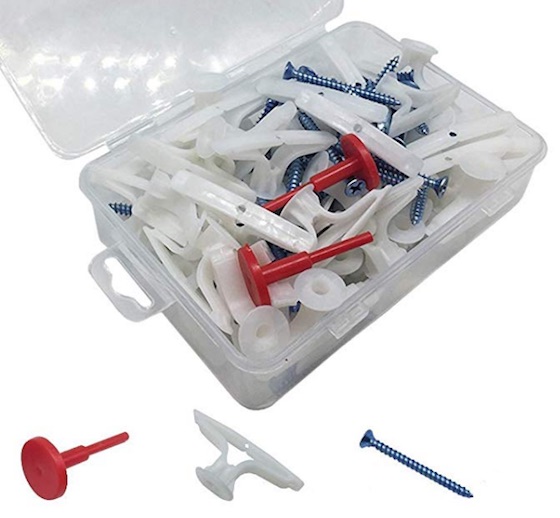Wall Anchors for Concrete, Block & Drywall

This is my FAVORITE plastic anchor for drywall. It prevents damage from condensation should you use a metal expanding anchor! CLICK THE IMAGE to have these delivered to your home. You'll SAVE money buying them online.
DEAR TIM: We just purchased a home and need to build shelves, hang pictures, etc. on an assortment of walls. We have solid concrete, concrete block and drywall walls. Which type of wall anchors work best for each wall? What is the best way to drill into concrete and concrete block? T. I.
DEAR T. I.: It sounds to me like you are going to be busy. Fortunately the wall anchors you need are abundant. A well stocked hardware store should have exactly what you need.
The key to success lies in selecting a strong enough anchor for each particular job. Different sizes and types of anchors support different loads. In order to select the correct anchor, you must anticipate the load which is going to be placed on the anchor. This is not as difficult as it seems.
For example, I calculated that a cubic foot of one of my favorite magazines weighs nearly 60 pounds. If I were to build a set of shelves that was 6 feet wide by 7 feet tall and 1 foot deep, it could possibly be packed with 2,520 pounds of magazines! (CALCULATION: 6 x 7 x 1 x 60lbs = 2,520 pounds) If a total of 10 anchors will be used to secure the shelves to the wall, each anchor needs to have a minimum strength of 252 pounds. High quality anchor manufacturers publish anchor capacities. This information should be readily available at the hardware store.
If you are building these shelves on a solid concrete wall, I would suggest that you use a one piece expansion anchor. I have used thousands of these nifty devices. These anchors have bolt threads at one end and an expansion cone surrounded by metal wedges at the other end. It is driven with a hammer into a specific diameter hole which matches the anchor's outer diameter. Once driven into the hole, you begin to tighten a nut on the threaded end. As the nut turns, the expansion cone drives the wedges tightly into the sides of the hole.
The expansion anchors can hold enormous weight. A typical three eighths inch expansion anchor which is embedded only 2.5 inches in a sound concrete wall can resist 1,200 pounds of pull!
If you need to hang a bracket or something else on a hollow concrete block wall, you should consider using a metal sleeve anchor. This anchor consists of a threaded shaft which is surrounded by a full length expanding sleeve. The shaft has an expansion cone which forces the outer sleeve to mushroom out as a nut at the other end of the shaft is tightened. Once again, you must match the hole that you drill to the size of the anchor. These anchors often have similar strengths as the expansion anchors.
If you hang a picture on drywall, it better be light. Often the drywall is the limiting factor with regards to anchor pullout or failure. 1/2 inch drywall can usually only withstand a pullout force of 15 pounds per anchor. This same drywall can only support a 40 pound load per anchor. Drywall anchors are like giant coarse threaded screws with a hole in the center. You simply screw the anchor into the drywall at the desired location. Then you install a small screw into the center of the anchor.
Drilling holes in concrete or concrete block is a breeze. You should consider purchasing a battery powered hammer drill. These drills spin a carbide tipped bit that chips away at the concrete thousands of time per minute. They can often drill a 4 inch deep by one quarter inch diameter hole in solid concrete in less than 30 seconds. Many of them can accept standard bits to drill in wood and drywall. When drilling in these materials you simply switch off the hammer control.
One Response to Wall Anchors for Concrete, Block & Drywall